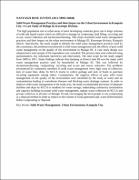| dc.description.abstract | NANYANZI ROSE JUSTINE (2011-M092-20040)
Solid Waste Management Practices and their Impact on the Urban Environment in Kampala City: A Case Study of Mulago iii, Kawempe Division.
The high population size in urban areas of most developing countries gives rise to large volumes of solid and liquid wastes which are difficult to manage by composing, land filling, recycling and re-use, source reduction and incineration/burning. This study examined solid waste management practices and their impact on the urban environment in Mulago III, Kawempe division, Kampala district. Specifically, the study sought to identify the solid waste management practices used by the community, the problems encountered in solid waste management and, the effects of poor solid waste management on the quality of the environment in Mulago III. A case study design was adopted and a total sample of 93 respondents was consulted. The primary data were collected using questionnaires, key informant interviews and observation. The time scope for the study ranged from 2009 to 2011. Study findings indicate that dumping at Kiteezi land fill was the major solid waste management practice used by households in Mulago III. This was followed by incineration/burning, compositing, recycling and re-use and source reduction. The problems encountered by community members in solid waste management were: high costs of collection, lack of waste bins, delay by KCCA trucks to collect garbage and lack of funds to purchase recycling equipment among others. Consequently, the negative effects of poor solid waste management on the quality of the environment were identified by the study as water and air contamination leading to waterborne diseases and blocking water drainage systems. In order to improve solid waste management in the study area, the study recommended provision of adequate dustbins and skips by KCCA to residents for waste storage, undertaking community sensitisation and capacity building on proper solid waste management, regular waste collection by KCCA and private collectors in all parts of Mulago III and, encouraging the local people to use compositing as a disposal method in order to reduce on the volume of waste generated and, waste differentiation before compositing or disposal.
Key Words: Solid Waste Management, Urban Environment, Kampala City. | en_US |


